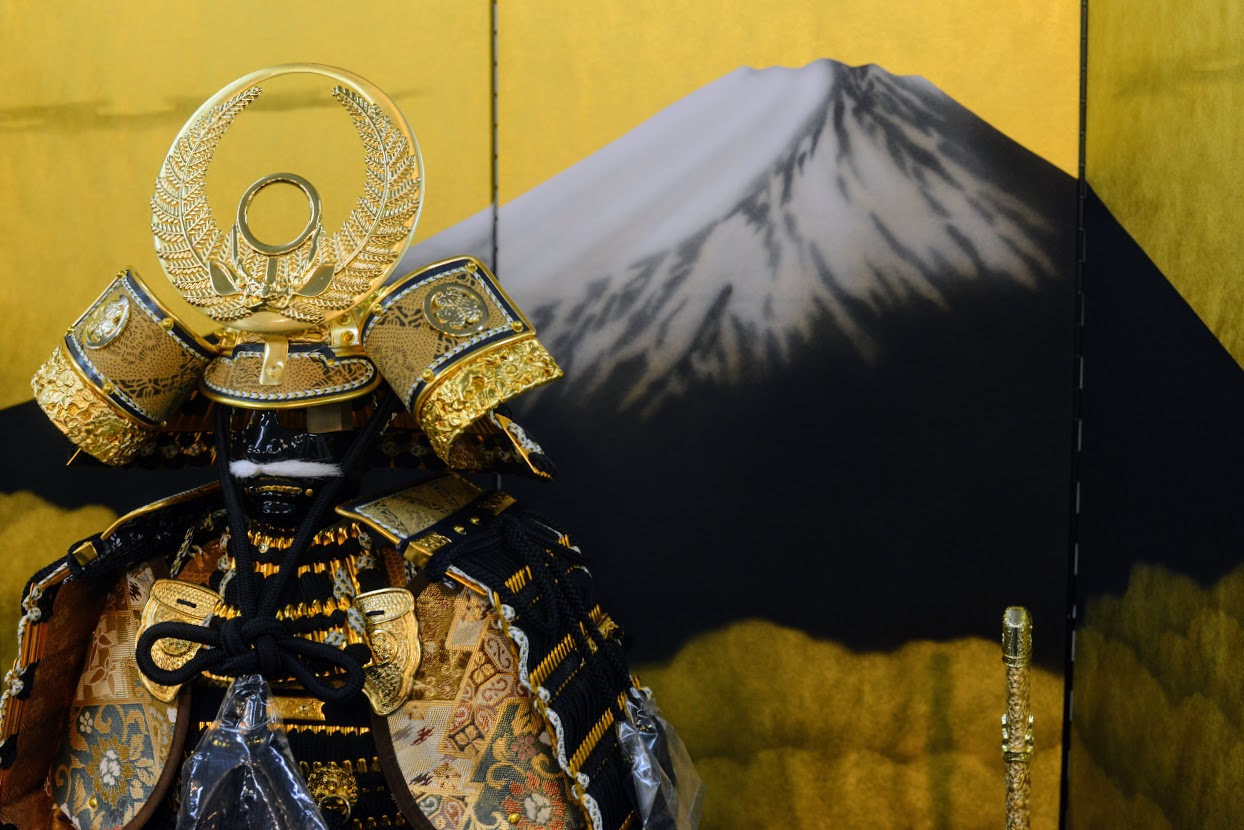
Hamayumi are put up with a wish that boys grow up to be healthy and strong like an arrow that vanquishes evil.
Only four suitable feathers can be taken from a single hawk. The feather pattern differs with each bird so a set of arrow decorations uses four arrow feathers. This also includes a meaning of eradicating evil from four directions.

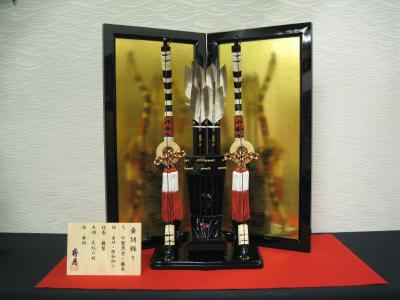
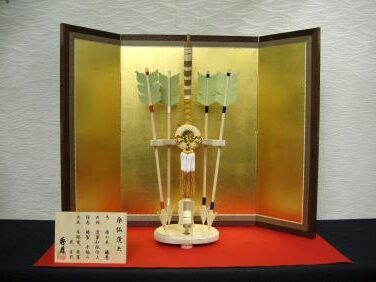
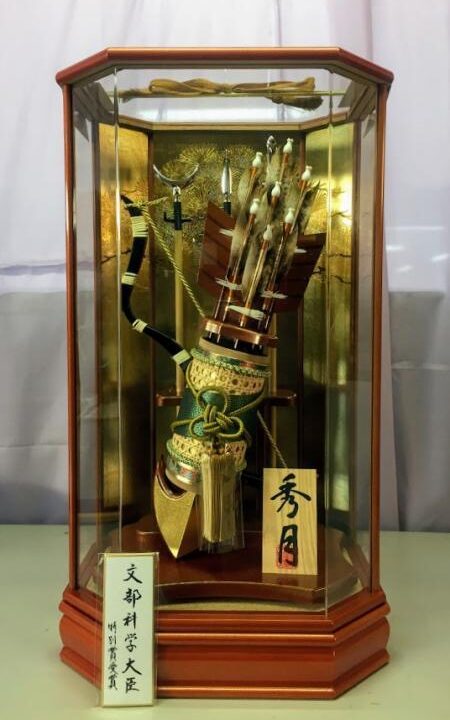
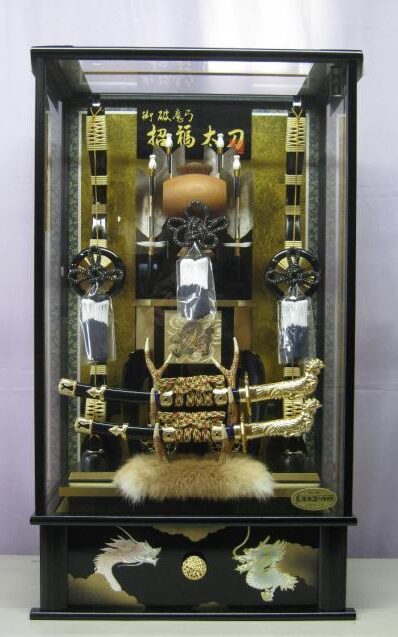
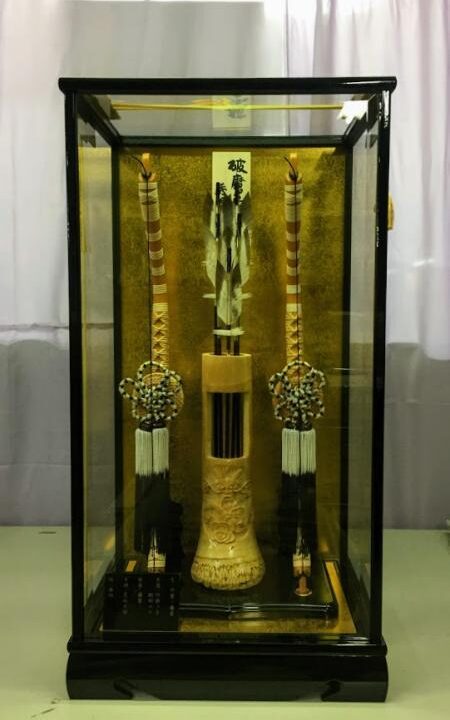
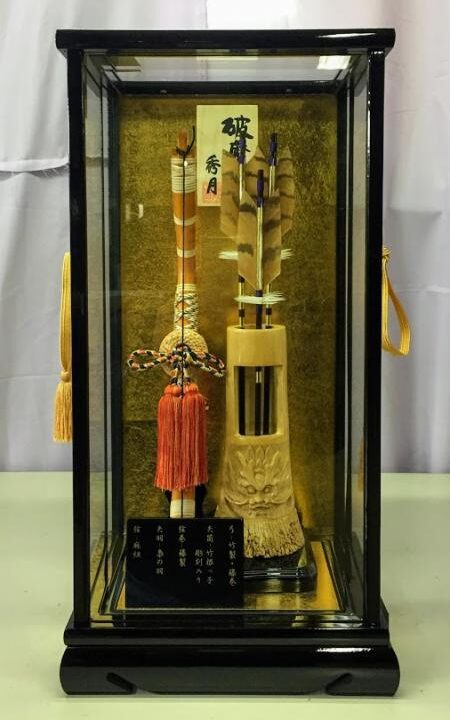
Depending on the number of feathers on the Hamayumi, each feather has a distinct meaning.
■ Four-arrow Hamayumi Decoration
It represents the four gods of the four cardinal directions.
– [East]: Azure Dragon – Family Prosperity
– [West]: White Tiger – Spousal Harmony
– [South]: Vermillion Bird – Blessings of Peace
– [North]: Black Tortoise – Prosperity and Longevity
- 東・・・青龍 家運隆盛
- 西・・・白虎 夫婦円満
- 南・・・朱雀 平安招福
- 北・・・玄武 繁栄長寿
■ Five-arrow Hamayumi Decoration
Since the time of Japan’s oldest collection of poetry, the Manyoshu, these colors have been considered the highest-ranking and represent the Five Elements philosophy and virtues of humanity, justice, etiquette, wisdom, and faithfulness.
– [Blue]: The Power to Bring About Life & The = — Source of Life Force
– [White]: An Unshakable Heart & Hope
– [Vermillion]: A Strong Heart
– [Black]: Dignity & Respect for Others
– [Yellow]: An Open Heart
- 青色・・・生まれ生ずる力・生命力の源
- 白色・・・何事にも動じない心・希望
- 朱色・・・強靭な心
- 黒色・・・尊厳・人を尊ぶ心
- 黄色・・・広い心
■ Six-arrow Hamayumi Decoration
It represents the six virtues.
Wisdom: A True Heart
– [Humanity]: A Compassionate Heart
– [Hope]: A Pure Heart
– [Justice]: A Heart that Values Family & Siblings
– [Loyalty]: An Honest Heart
– [Tranquility]: A Calm & Peaceful Heart
- 知・・・直な心
- 仁・・・思いやる心
- 聖・・・汚れの無い心
- 義・・・家族・兄弟を大切にする心
- 忠・・・偽りの無い心
- 和・・・穏やかな平和な心
■ Seven-arrow Hamayumi Decoration
It represents the blessings of the Seven Lucky Gods.
Wisdom: A True Heart
– [Ebisu]: God of the Sea, Fishing, and Business Prosperity
– [Daikokuten]: Guardian Deity of Buddhism, God of War & Battle, Later Became God of Kitchens
– [Bishamonten]: Guardian Deity of the North, Guardian Deity of Wealth
– [Benzaiten]: Goddess who Controls Music, Talent, Wealth, and More Hotei: God of Family
– [Harmony Fukurokuju]: God of Happiness, Followed by Many Cranes
– [Jurojin]: God of Longevity, Travels with a Deer
- 恵比寿・・・海上・漁業・商売繁盛の神
- 大黒天・・・仏教の守護神 戦闘神・忿怒神。後に厨房神となる
- 毘沙門天・・・北方世界の守護神、金運財宝を守る神
- 弁財天・・・音楽・弁才・財福などを掌る女神
- 布袋・・・家庭円満の神
- 福禄寿・・・多くの鶴を従える幸福の神
- 寿老人・・・鹿を連れた長寿の神
Hamayumi’s history
Hamayumi have been placed in places like shrines since ancient times to ward off evil and have also been used in various rituals. It is believed that this became popular sometime around the 10th century.
The practice of giving Hamayumi to celebrate the First New Year’s Day when a son was born to a samurai or merchant family started mainly in castle towns and spread throughout the country. While based on Japanese tradition, this custom remains to this day and represents a hope that the Hamayumi will drive away evil and the boy will grow up healthy and strong.

